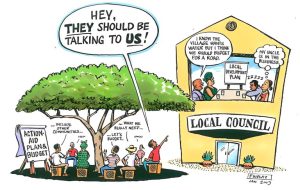The upcoming debates on the Online Safety Bill and Anti-Terrorism Act in Sri Lanka’s parliament highlight a worrying trend: over 70% of the population are unaware of these critical bills, according to a study by the Centre for Policy Alternatives. This lack of awareness reflects a broader deficit in public engagement and understanding of legislative processes.
This apathy and disengagement aren’t unique. Often, bills sail through parliament with little public scrutiny, particularly when the ruling party holds a majority. This can lead to the erosion of public trust in government and a feeling of powerlessness among citizens.
It’s time for a paradigm shift. Sri Lanka’s lawmakers must embrace deliberative politics, moving beyond rubber-stamping decisions and becoming active participants in informed discussion.

There are several real-world examples where political deliberation has significantly impacted government decision-making. Here are a few cases:
1. Ireland’s Abortion Referendum (2018):
• Prior to the referendum, Ireland had one of the most restrictive abortion laws in Europe. A deliberative campaign involved Citizens’ Assemblies, randomly selected groups of citizens who received expert briefings and engaged in extensive discussions. This process led to an overwhelming public vote in favor of repealing the abortion ban, demonstrating the power of informed public deliberation in shaping social policy.
2. Oregon Citizens’ Initiative Review (1999-2013):
• This program randomly selected groups of citizens to review proposed ballot initiatives, considering their potential impacts and providing their recommendations. Over a fifteen-year period, the program influenced several ballot measures, with some initiatives being withdrawn or significantly modified based on the citizens’ deliberation and feedback.
3. Icelandic Constitutional Reform (2010-2012):
• Following the 2008 financial crisis, Iceland initiated a deliberative process involving public forums, online discussions, and elected citizen assemblies to rewrite the country’s constitution. This inclusive approach led to a new constitution reflecting the public’s priorities and concerns, marking a significant shift in Iceland’s political landscape.
4. Canadian Senate Reforms (2015-present):
• Deliberative processes with Senators and appointed citizen representatives have been used to explore potential reforms to the Canadian Senate, a long-standing issue of public debate. While a final decision on reform is still pending, the ongoing deliberation has helped generate wider public understanding and potential solutions to improve the Senate’s legitimacy and effectiveness.
5. Local Government Initiatives:
• Several local governments around the world, including Vancouver (Canada) and Porto Alegre (Brazil), have incorporated deliberative practices into their budget allocation processes. Citizens’ juries and randomly selected budget review committees have been used to consider spending priorities and public needs, leading to more transparent and citizen-engaged budgeting decisions.
. Gram Sabhas (Village Assemblies):
Institution rooted in India’s 73rd Constitutional Amendment, mandating regular meetings of all adult villagers to discuss and decide on local governance matters.
Provide a platform for deliberation on issues like resource allocation, infrastructure development, social welfare programs, and conflict resolution.
While their effectiveness varies, successful Gram Sabhas have demonstrated potential for participatory decision-making and empowerment of local communities.
2. Participatory Budgeting in Kerala:
Kerala’s People’s Planning Campaign, launched in the 1990s, involves citizens in identifying local development needs and allocating public funds.
Sri Lanka implemented Jana Sabha or Peoples assemblies, but it is largely a non starter. JanaSabha were set to facilitate participatory democracy but nothing or little is happening.







